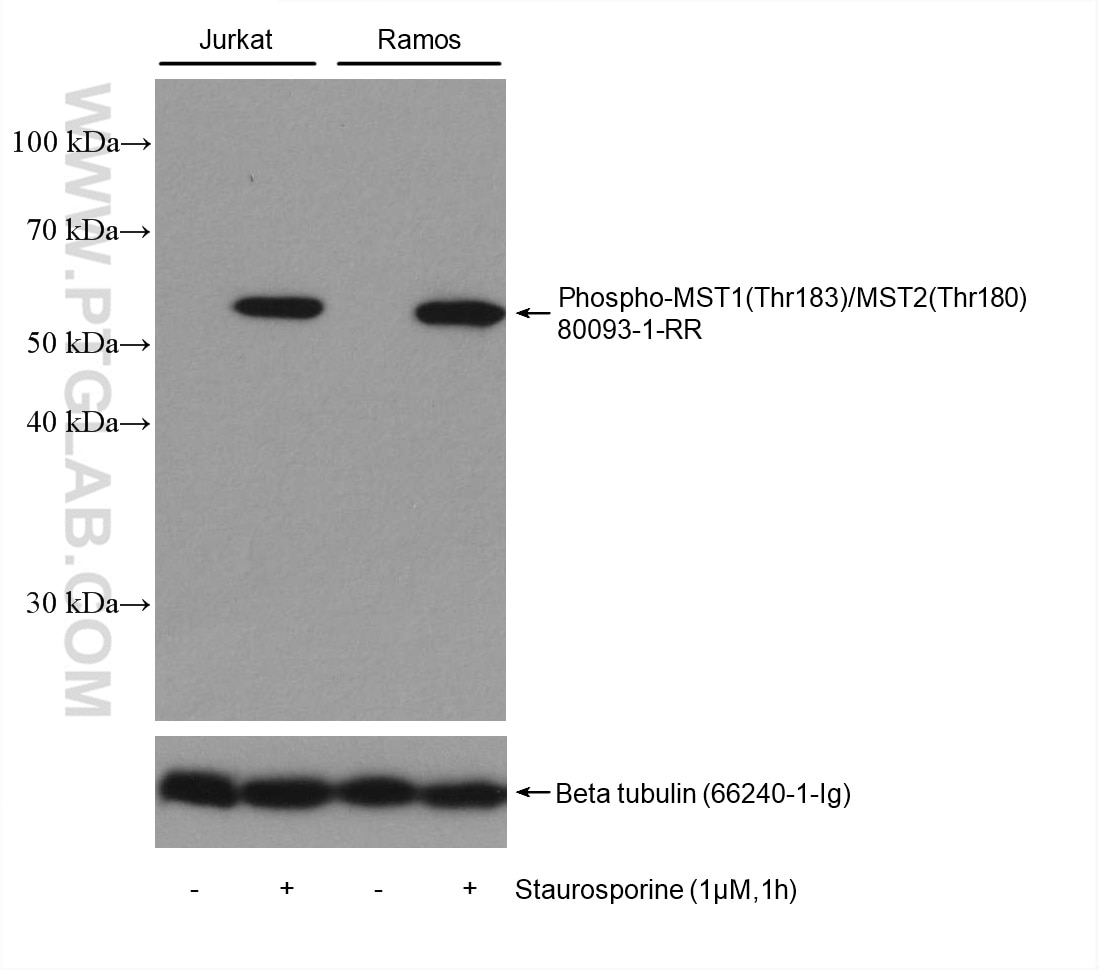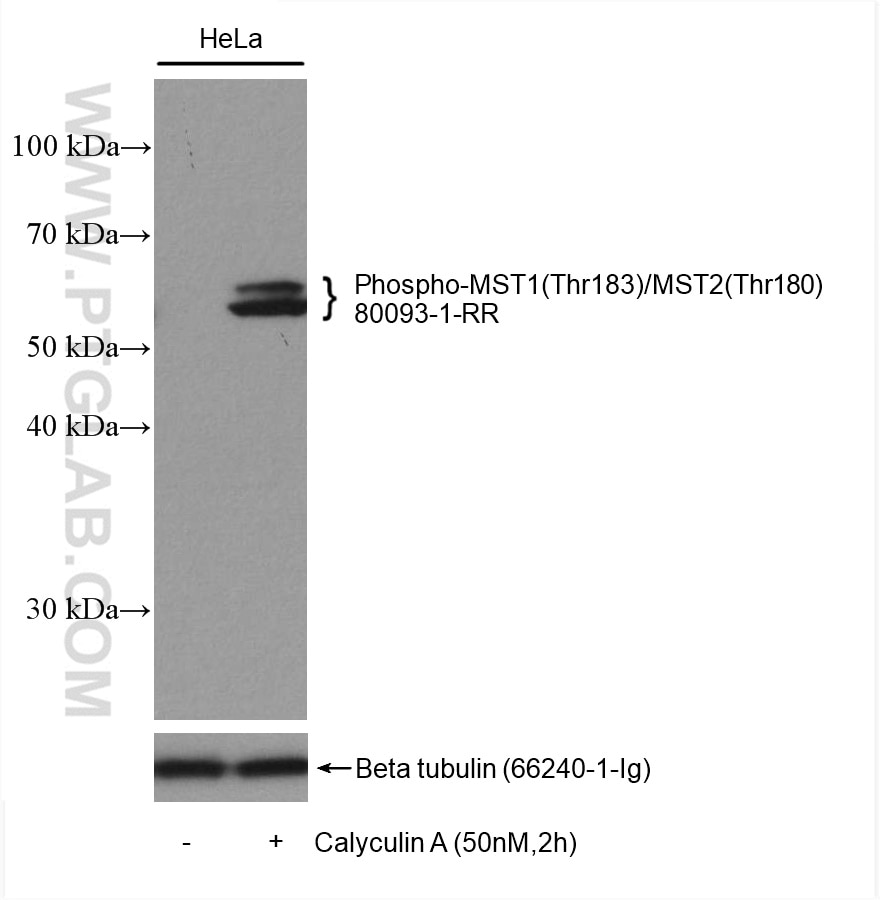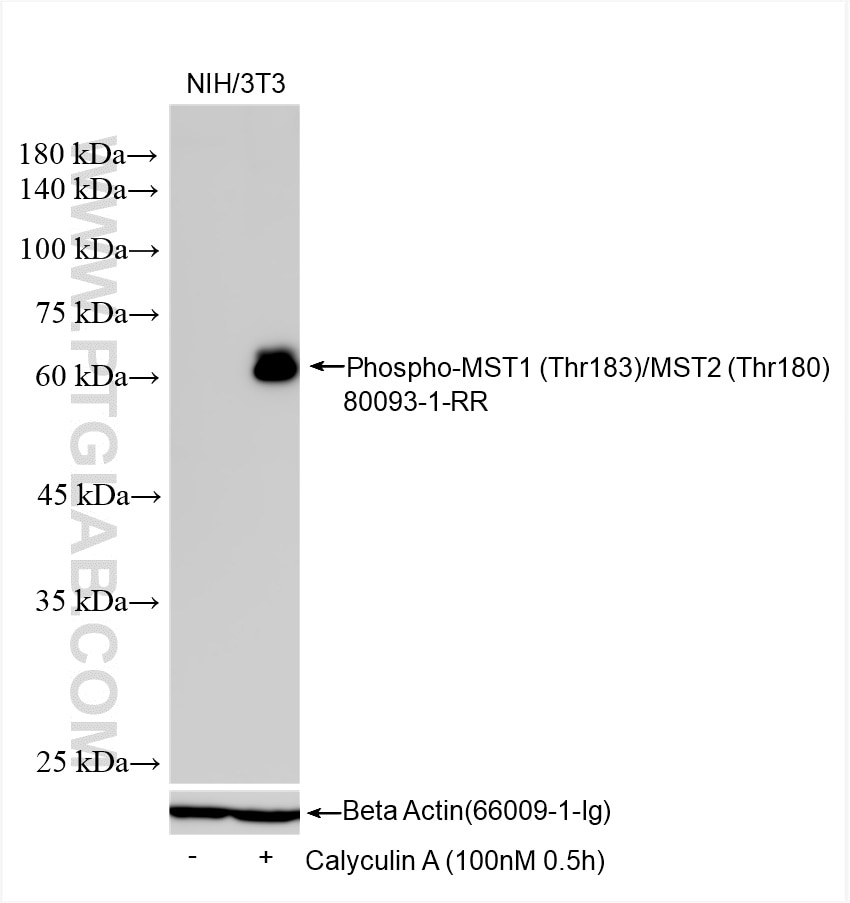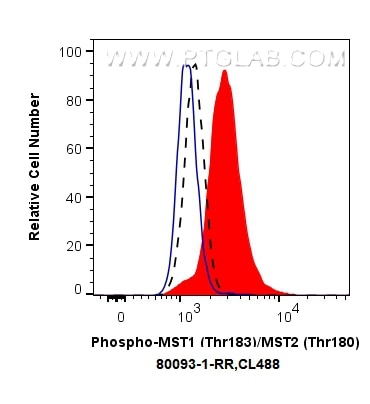Phospho-MST1 (Thr183)/MST2 (Thr180) Rekombinanter Antikörper
Phospho-MST1 (Thr183)/MST2 (Thr180) Rekombinant Antikörper für WB, FC (Intra), ELISA
Wirt / Isotyp
Kaninchen / IgG
Getestete Reaktivität
human, Maus und mehr (1)
Anwendung
WB, FC (Intra), ELISA
Konjugation
Unkonjugiert
CloneNo.
1P6
Kat-Nr. : 80093-1-RR
Synonyme
Geprüfte Anwendungen
| Erfolgreiche Detektion in WB | Jurkat-Zellen, Mit Calyculin A behandelte HeLa-Zellen, mit Calyculin A behandelte NIH/3T3-Zellen, HeLa-Zellen, mit Staurosporin behandelte Jurkat-Zellen, mit Staurosporin behandelte Ramos-Zellen |
| Erfolgreiche Detektion in FC (Intra) | Mit Calyculin A behandelte HeLa-Zellen |
Empfohlene Verdünnung
| Anwendung | Verdünnung |
|---|---|
| Western Blot (WB) | WB : 1:2000-1:10000 |
| Durchflusszytometrie (FC) (INTRA) | FC (INTRA) : 0.25 ug per 10^6 cells in a 100 µl suspension |
| It is recommended that this reagent should be titrated in each testing system to obtain optimal results. | |
| Sample-dependent, check data in validation data gallery | |
Veröffentlichte Anwendungen
| WB | See 7 publications below |
Produktinformation
80093-1-RR bindet in WB, FC (Intra), ELISA Phospho-MST1 (Thr183)/MST2 (Thr180) und zeigt Reaktivität mit human, Maus
| Getestete Reaktivität | human, Maus |
| In Publikationen genannte Reaktivität | human, Maus, Ratte |
| Wirt / Isotyp | Kaninchen / IgG |
| Klonalität | Rekombinant |
| Typ | Antikörper |
| Immunogen | Peptid |
| Vollständiger Name | serine/threonine kinase 4 |
| Berechnetes Molekulargewicht | 56 kDa |
| Beobachtetes Molekulargewicht | 59 kDa |
| GenBank-Zugangsnummer | BC005231 |
| Gene symbol | MST1 |
| Gene ID (NCBI) | 6789 |
| Konjugation | Unkonjugiert |
| Form | Liquid |
| Reinigungsmethode | Protein-A-Reinigung |
| Lagerungspuffer | PBS with 0.02% sodium azide and 50% glycerol |
| Lagerungsbedingungen | Bei -20°C lagern. Nach dem Versand ein Jahr lang stabil Aliquotieren ist bei -20oC Lagerung nicht notwendig. 20ul Größen enthalten 0,1% BSA. |
Hintergrundinformationen
Mammalian STE20-like serine-threonine kinase MST1, encoded by the STK4 gene, is a multifunctional protein. MST1 and its closest paralogs MST2 (encoded by the STK3 gene), MST3, and MST4 are members of the Class II Germinal Center Family of Protein Kinases . STK3/4 and LATS1/2 (large tumor suppressor 1 and 2) are core kinase components of the Hippo tumor suppressor pathway in mammalians . In the conventional Hippo pathway, the STK3/4 and LATS1/2 signaling cascade phosphorylates and inactivates the transcriptional coactivator YAP1 (yes associated protein 1) and its close paralog WWTR1]. YAP1 and WWTR1 do not have DNA binding domains and they exert their biological outputs, such as cell proliferation and survival, by interacting with the TEAD1-4 transcription factors. Lines of evidence have indicated that dysregulation or loss of STK4/Hippo signaling is linked to developmental disorders and carcinogenesis with poor prognosis. STK4 is a stress-induced kinase and it can be activated in response to cell-death inducers. Autophosphorylation of STK4 at Thr183 (Thr180 in STK3) in the activation loop is a key activation mechanism for STK4/3 because phosphorylation of Thr183/180 causes the cleavage of STK4 by caspases under apoptotic conditions. The caspase-cleavage results in a more active STK4 protein (STK4-N, an amino-terminally truncated STK4), which localizes into the nucleus and induces apoptosis through histone modifications and chromatin condensations.
Protokolle
| PRODUKTSPEZIFISCHE PROTOKOLLE | |
|---|---|
| WB protocol for Phospho-MST1 (Thr183)/MST2 (Thr180) antibody 80093-1-RR | Protokoll herunterladen |
| STANDARD-PROTOKOLLE | |
|---|---|
| Klicken Sie hier, um unsere Standardprotokolle anzuzeigen |
Publikationen
| Species | Application | Title |
|---|---|---|
Ecotoxicol Environ Saf Role of the hippo signaling pathway in the extracellular matrix degradation of chondrocytes induced by fluoride exposure | ||
J Hazard Mater Prenatal and postnatal exposure to polystyrene microplastics induces testis developmental disorder and affects male fertility in mice | ||
Nat Commun KK-LC-1 as a therapeutic target to eliminate ALDH+ stem cells in triple negative breast cancer | ||
Exp Eye Res Targeting mechanics-induced trabecular meshwork dysfunction through YAP-TGFβ Ameliorates high myopia-induced ocular hypertension | ||
Biochim Biophys Acta Mol Basis Dis Hippo pathway activated by circulating reactive oxygen species mediates cardiac diastolic dysfunction after acute kidney injury | ||
Cells Activation of Yes-Associated Protein Is Indispensable for Transformation of Kidney Fibroblasts into Myofibroblasts during Repeated Administration of Cisplatin |





